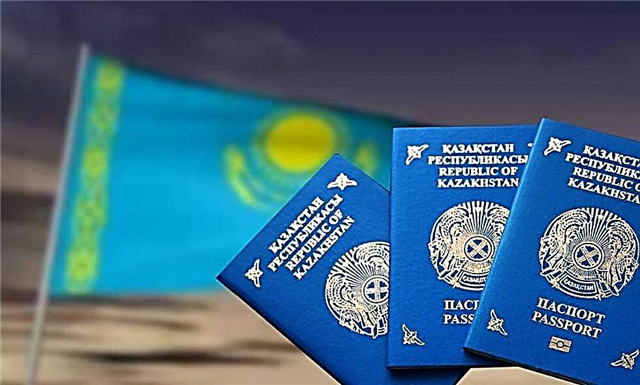Over the past ten years, the Polish economy has shown excellent results: stability, GDP growth, an increase in the purchasing power of the population. CIS citizens working in the Polish Republic also contributed to this success. At the same time, those Russians who have decided to start their business in Poland should understand that Poland is a country of small and medium-sized businesses (there are not many oligarchs-monopolists here) and that the conditions for doing business here differ in many respects from Russian realities. Let's take a closer look at the rules of the game.

Business in Poland and its main features
Business activities in Poland are regulated by the Civil Code of the Republic of Poland and laws such as:
- "Code of Trade Companies" of September 15, 2000 (Kodeks Spółek Handlowych - U nr 94 poz.1037);
- "On economic activity" dated November 19, 1999;
- "On the free conduct of business" dated July 2, 2004 ("On swobodzie działalności gospodarczej". Dz.U. 2004 nr 173 poz).
These documents contain general principles of economic activity in general and entrepreneurship in particular. These include:
- complete freedom to choose the type of economic activity and entrepreneurship;
- minimizing government interference in economic activity and its regulation with the help of market mechanisms;
- equality in rights (to receive loans, to provide means of production) and obligations of all business entities - private, state, foreign, Polish.
If a resident of another state owns more than 50% of the shares of a company, it is considered foreign. International agreements between Poland and other states may provide for additional rights or obligations for businessmen from these countries.
You can check the availability of such agreements in the online database of agreements on the website of the Ministry of Foreign Affairs of the Republic of Poland.
Polish legislation distinguishes several categories of foreigners: from EU states, from countries participating in special agreements with Poland and the rest of the world. Depending on the category for foreign businessmen, there are clearly defined rules that they must follow:
- Citizens of EU states, as well as countries participating in agreements with the EU, are entitled to do business in Poland in any form and under the same conditions as Polish citizens (clause 2 of article 13 "On swobodzie działalności gospodarczej" 2004 nr 173 poz) ;
- CIS citizens, in order to have the same right, must legally register their stay in the country: have a Pole's Card, obtain a residence permit or permanent residence, have refugee status;
- for the purchase or lease of real estate, it is necessary to obtain permission from the Ministry of Privatization;
- the company must be registered with the CEIDG bureau;
- to conduct activities in the field of sea and air transportation, jurisprudence, real estate, wholesale trade in imported goods, in the military field, a special license is required.
The fulfillment of the above requirements is fully compensated for by the numerous advantages and bonuses that entrepreneurship in Poland brings. These include:
- ease of legalization of business at a minimum cost;
- favorable geopolitical position of Poland, mental and linguistic proximity of the Slavic population for Belarusians, Russians and Ukrainians;
- equal rights for foreign and Polish companies, observance by the Polish government of all guarantees for business;
- Residence permit for a foreign businessman and his family with the prospect of obtaining permanent residence, free movement in the Schengen area;
- the ability to enter new markets for an existing business;
- understandable tax system;
- availability of profitable lending in Polish banks;
- the ability to save assets in banks in EU countries;
- the right to purchase a vehicle and register it for a company in Poland;
- additional bonuses for entrepreneurship in the field of cargo transportation;
- the right to conduct business, receive subsidies and subsidies in other EU countries;
- absence of customs duties when trading with EU countries;
- affordable prices for real estate;
- VAT refund on overpayments;
- the ability to store and use other currencies other than zloty for calculation;
- minimization of bureaucratic procedures, simplified tax documentation;
- conducting tax audits on the seventh day after notification.
Possible disadvantages are associated with the restriction of foreign businessmen in choosing the form of doing business (Art. 13 of the Law of the Republic of Poland "On swobodzie działalności gospodarczej". 2004 nr 173 poz) and the selection of personnel: the most trained personnel leave the country in search of higher earnings in Germany, Ireland and others states of Europe.
Certain risks also exist in connection with unpredictable migration processes that may affect the change in the policy of the Polish government in relation to migrants.

What types of business in Poland are the most promising for Russian citizens
Speaking about promising types of business activities, one should distinguish an already existing, "promoted" business, which the owner transfers to Poland, from a business that needs to be started from scratch. First of all, beginners should identify those types of services or products that are most in demand in a particular region, and, accordingly, free niches for business.
Practice shows that the establishment of a new company is most promising in the following industries:
- gastronomic sphere: catering points: cafes, pizzerias with home delivery, home cooking, cafeterias, pubs, restaurants;
- services: car washes, service stations, kindergartens, real estate agencies, beauty salons, grooming and pet care, hairdressing salons, furniture repair and assembly, cargo transportation, language schools;
- in the field of IT technologies: software and hardware;
- the sphere of trade in second hand goods and stock from the USA, France, Ireland.
An additional advantage for Russian businessmen is the ability to find clients not only among the local population, but also among Russian-speaking citizens from the CIS countries.
Organizational and legal forms of doing business in Poland
The choice of the legal form of doing business can significantly affect further business activities, free from unnecessary costs and unnecessary bureaucratic procedures. Organizational forms of business are chosen by the entrepreneurs themselves within the limits permitted by the legislation of the Republic of Poland.
For Russian citizens (as well as for Ukrainians), the most typical forms of doing business in Poland are:
- private enterprise (Jednoosobowa działalność gospodarcza) or individual entrepreneur. This option is available only to a foreigner who owns a Pole Card or a Residence Card. Alternatively, you can find a business partner in Poland. It involves a minimum of formalities - you just need to send an application to CEIDG, and no start-up capital is required. Cons: monthly deductions from ZUS, the individual entrepreneur is responsible for financial obligations with his own property;
- limited liability company - LLC (Spółka z ograniczoną odpowiedzialnością (Z.o.o.)) - the best option for foreigners; 85% of all foreign firms in the country are LLCs. The required size of the authorized start-up capital is PLN 5,000. Cons: mandatory full accounting, complex registration system.

Buying a business in Poland: simple and effective
One of the easiest ways of business immigration and the opportunity to start your own business in Poland is to buy an existing business. It can be a large company or a small company - it all depends on the financial capabilities of the buyer. You can buy a ready-made business:
- through specialized firms. They have their own databases, conduct audits, and offer various purchase options. However, their services will require considerable financial costs;
- directly from the owner of the firm or company.
Before making a deal, it is advisable to check the company - you can order a paid audit or independently familiarize yourself with the open information in the KRS database on the website of the Ministry of Justice of the Republic of Poland.
The procedure for registering a transaction takes place at a notary, who will draw up an agreement within 2-3 hours and make the necessary changes to the papers.
When buying, keep in mind that:
- the reason for the sale may be the company's debts, which will become known later;
- in a small business, the secret of success often depends on the owner and with his departure it becomes simply unviable.
Business registration: step by step instructions
After the decision to establish a company in Poland is made, it is necessary to start legalizing your business.
To open an IP in Poland, you need to go through three stages:
- Submission of the CEIDG-1 form. Instructions for completing it are available on the CEIDG website.
It should be borne in mind that the success of registration depends on the correct filling of the form (consisting of 30 parts):
- in the 1st part, the purpose of the filing should be indicated - put a tick in the box "1 - wniosek o wpis do CEIDG";
- 2nd part - skip (to be filled in at the place of filing);
- The 3rd part must contain personal data: gender, full name, date of birth, data about parents. You should pay attention to clause 15, in which you should indicate “tak, składam oświadczenie”, otherwise the application will be considered to be completed incorrectly;
- The 4th and 5th parts are devoted to the place of current residence and winterization (registration);
- in the 6th and 7th parts, the name of the company (full name) and the number of prospective employees should be indicated;
- 8th - the date of the beginning of the business activity of the company (must be later than the date of application);
- 9th - contact information: phone number, website (will be publicly available);
- The 10th and 11th parts are devoted to the main and additional place of business, address for correspondence (mandatory in Poland);
- 12th part - the date from which contributions to the social security authority (ZUS) must be paid. Within 7 days after the establishment of the company, a special application must be submitted to ZUS (form ZUS ZUA)
- The 13th part concerns farmers and social insurance offices for them (KRUS);
- Parts 14-16 concern only previously registered individual entrepreneurs;
- 17-19th - indicate the tax office at the place of residence of the entrepreneur and the acceptable form of taxation (general, linear, simplified, tax card); when the prepayment will be made - monthly / quarterly;
- Parts 20-22 - type of accounting: accounting books, tax books of income and expenses, income accounting (simplified form), location of documentation;
- 23-25th parts - we are talking about special forms with an indication of partner companies;
- 26th part - information on the presence or absence of joint assets with the spouse;
- Part 27 - bank accounts. Of these, you need to choose one for a possible tax refund;
- 28th - foreign identification numbers (if any);
- 29th - indicate data on authorized representatives (optional);
- Part 30 - information about the presence of attachments to the form.
You can submit an application to the administration of the commune in person, send it by mail (with certification of the signature by a notary), online; in the latter case, an electronic signature will be required, otherwise it is necessary to come to the office and sign the application there.
- Open a special bank account for an individual entrepreneur (you can also use a regular current account).
- Obtain a REGON number. A NIP number is also required. This number is required for settlements, contacts with tax authorities and insurance structures. For its registration, CEIDG itself sends the necessary data to the statistical office no later than one working day after the application is submitted.

Business taxes in Poland
There are several types of income taxation in Poland. Of these, a businessman has the right to choose the one that is more beneficial to him:
- taxation on general terms - on a tax scale depending on the amount of profit. This is beneficial if the profit is low - in this case, the tax rate will be 18%. If the amount of annual income exceeds PLN 85,528, the rate will already be 32%;
- linear tax - fixed at 19% and does not depend on the total volume of income;
- a simplified form (ryczałt ewidencjonowany) with five tax rates (3; 5.5; 8.5; 17 and 20%) on the income received (but not on profit);
- tax card - most often used in the field of gastronomy, entertainment, educational services. The amount of payments does not depend on the amount of income and is set individually by the tax service. Among the factors that can affect the amount of mandatory payments, one can name the size of the city, the type of service, and the age of the taxpayer.
The basic VAT rate is 23%, for certain categories - 5 and 8%. There is also a real estate tax, excise taxes and others in Poland.
Attracting foreign capital to Poland
The Polish government pays special attention to creating favorable conditions for the inflow of foreign capital into the economy, although Poland does not grant its citizenship in exchange for money. The country has created 14 free economic zones, in which there are benefits for foreign capital.
The Polish law "On Foreign Investments" has removed all restrictions on foreign investment, canceled the limit on the allowed export of income from the country.
Currently, among the leading foreign investors are American and Japanese businessmen: auto sector, electronics, chemical industry. It is more typical for Russian entrepreneurs to invest in Polish retail and residential real estate in Warsaw, large cities and resort areas.
What are the most frequently asked questions about starting a business in Poland?
Russians who decide for themselves the question of opening their own business in Poland or buying an existing one are interested in a lot: from how much income they can get to what their children will be given for breakfast in kindergarten. But, as a rule, most of the questions concern precisely the essence of doing business.
If you opened your own business in Poland, then in what time frame can you apply for permanent residence?
After five years of residence in Poland, in accordance with Article 195 of the Law of the Republic of Poland on Foreigners (Ustawa on cudzoziemcach z dnia 12 grudnia 2021 r), the owner of the LLC has the right to apply for permanent residence - Karty Stałego Pobytu. For its guaranteed receipt / renewal, a foreign businessman must fulfill several conditions:
- have a clear business plan aimed at the future development of their business;
- employ a Polish or foreign worker (or better than two) with the right to a residence permit for a period of at least a year for a full working day;
- the company must generate income of at least 10 thousand euros per year, or at least provide accommodation for the businessman and his family members (634 zlotys per month net for the head of the family and 514 for each non-working member);
- have housing and health insurance.
What are the difficulties for Russians when opening a business in Poland
Most often, Russian citizens face the following difficulties:
- the need for proficiency in Polish. Poor knowledge of the language can prevent the registration of a company (grammatical errors can become a hindrance when submitting documents), besides, Polish and Russian partners will experience difficulties in communication;
- ignorance of European business rules, inability to correctly draw up a business plan;
- lack of knowledge of local sales channels, market specifics.
All these difficulties are associated with poor information support and, as a rule, after a few years of living and working in Poland, they can be easily overcome.
Is it possible for a foreign citizen to get a loan to open a company in Poland and on what conditions
The procedure for obtaining a loan for the development of your business in Poland for foreign citizens is not too complicated. In 2021, new companies can apply for funding from the Regional Development Agency of their voivodeship. It is here that small and medium-sized businesses are credited under EU fund programs and their own programs (business development, equipment purchase, innovation).
Main requirements for lending:
- registration of LLC;
- business activity for at least 365 days;
- making investments (at the expense of credit funds) in the territory of the voivodeship;
- availability of an investment business plan;
- at least 10% of the amount is secured by personal participation.
The maximum loan amount is up to PLN 400 thousand for a period of up to 60 months. Interest rates depend on the market, the credit history of the borrower and the bank and, on average, range from 3.16 to 6.16% per year.
The issuance of a loan is subject to a commission: 1% of the loan body - for lending for up to two years and 1.5% - for lending over two years. Unsecured loans - up to 50 thousand zlotys, over - you will need a pledge (real estate, movable property), as well as guarantees from the guarantee fund.
Help in finding the best options can be provided by Polish financial and business portals (www.bankier.pl, mambiznes.pl), where you can select the best offers from banks and receive up-to-date information on annual interest rates on loans.
A foreign entrepreneur is also entitled to receive a subsidy of up to 300 thousand zlotys for his business (construction, purchase of equipment), which does not need to be returned.
In order to qualify for a subsidy that can cover 50% of the costs, you must:
- create at least one job and keep it for 2 years;
- prepare a business plan and an investment statement from the bank;
- submit an application for funding within the established time frame (consideration of applications is carried out annually in the form of a competition).
Interesting fact. For LLCs operating in rural areas, conditions have been created under which they can receive the maximum subsidized development assistance in two different institutions (Polish and EU) in the amount of 600 thousand zlotys.
Summing up
Poland provides foreign businessmen, including Russian citizens, favorable conditions for doing business: favorable organizational and legal forms (individual entrepreneur, LLC), a simple registration procedure, the possibility of obtaining a loan, clear laws and transparent rules. Russian citizens get the opportunity to do business in Poland in a new way, have access to advanced technologies, learn from useful experience and receive higher incomes.











